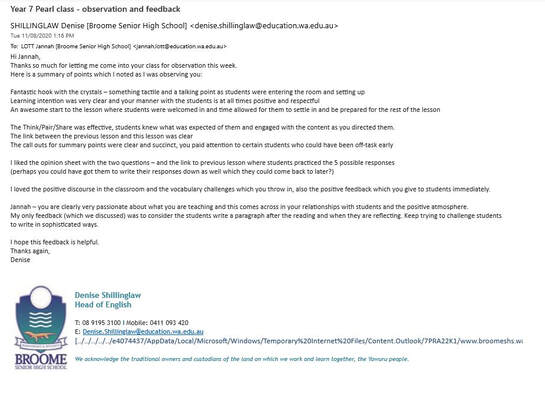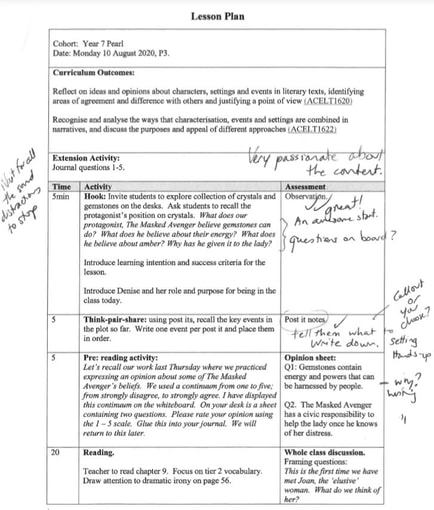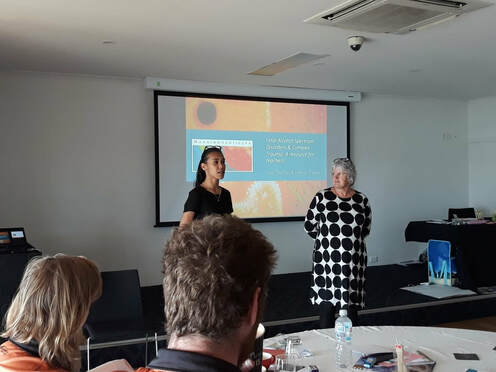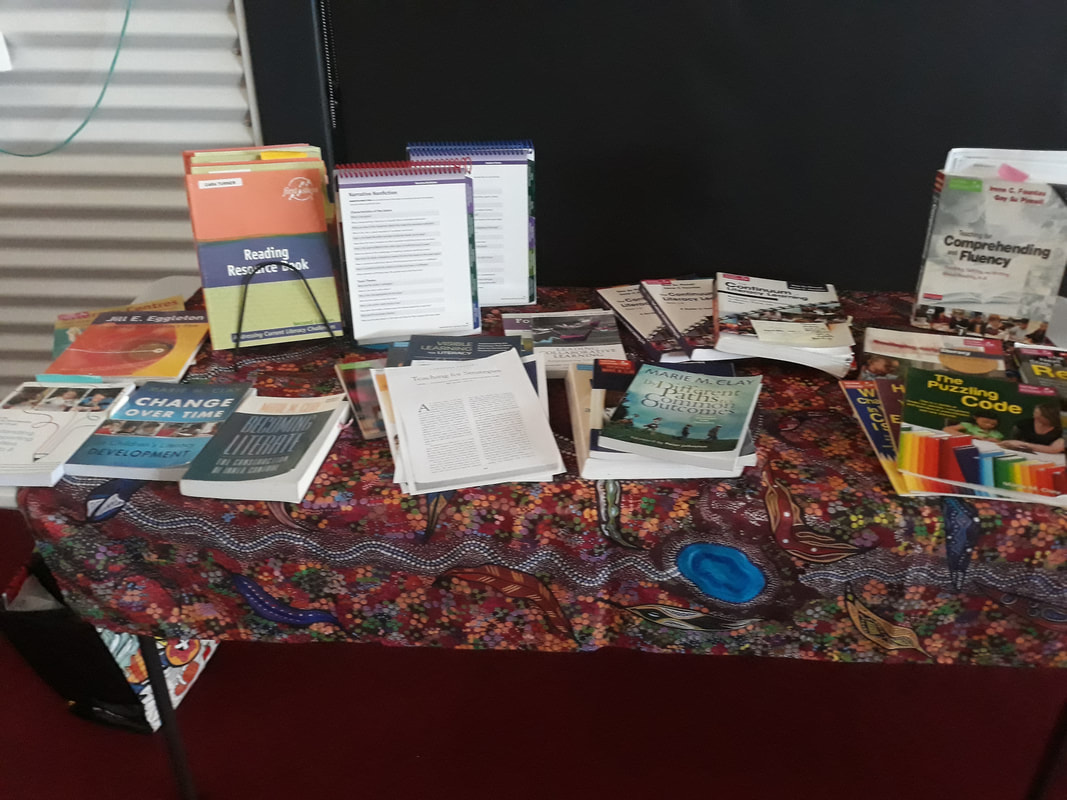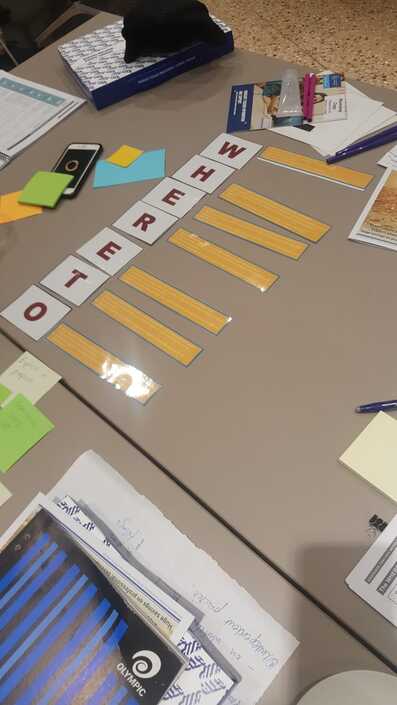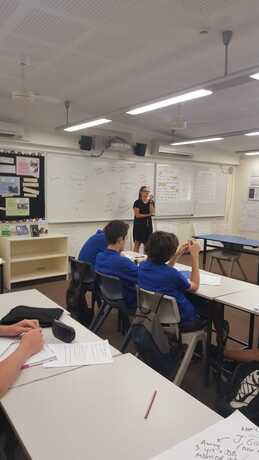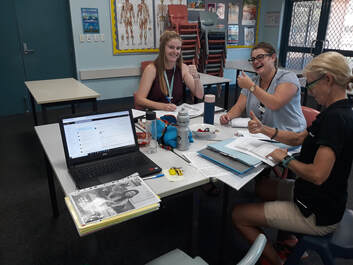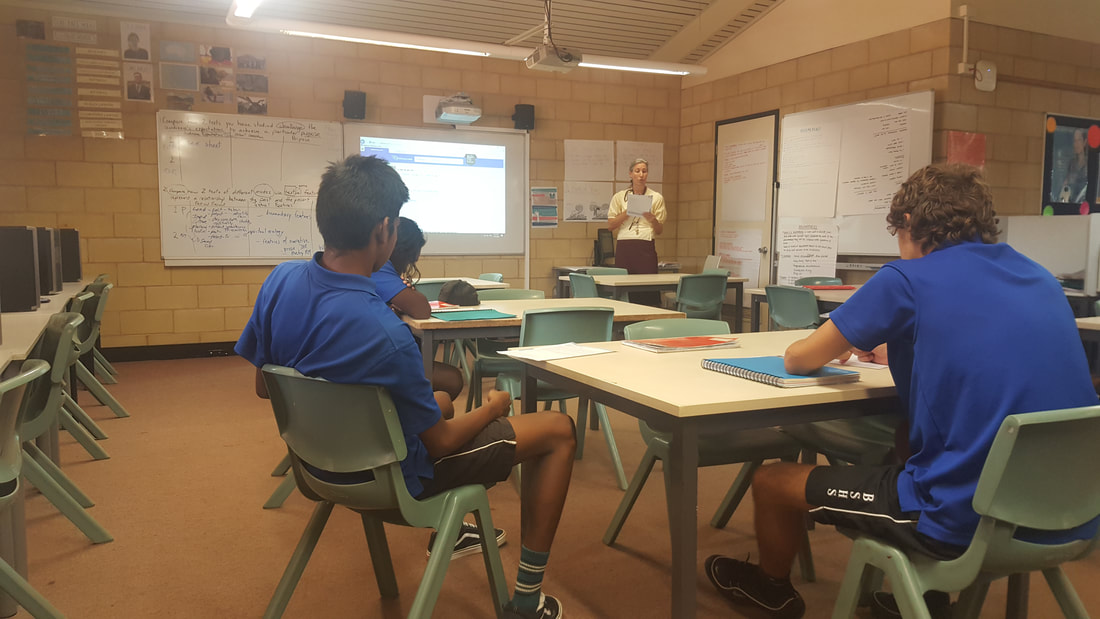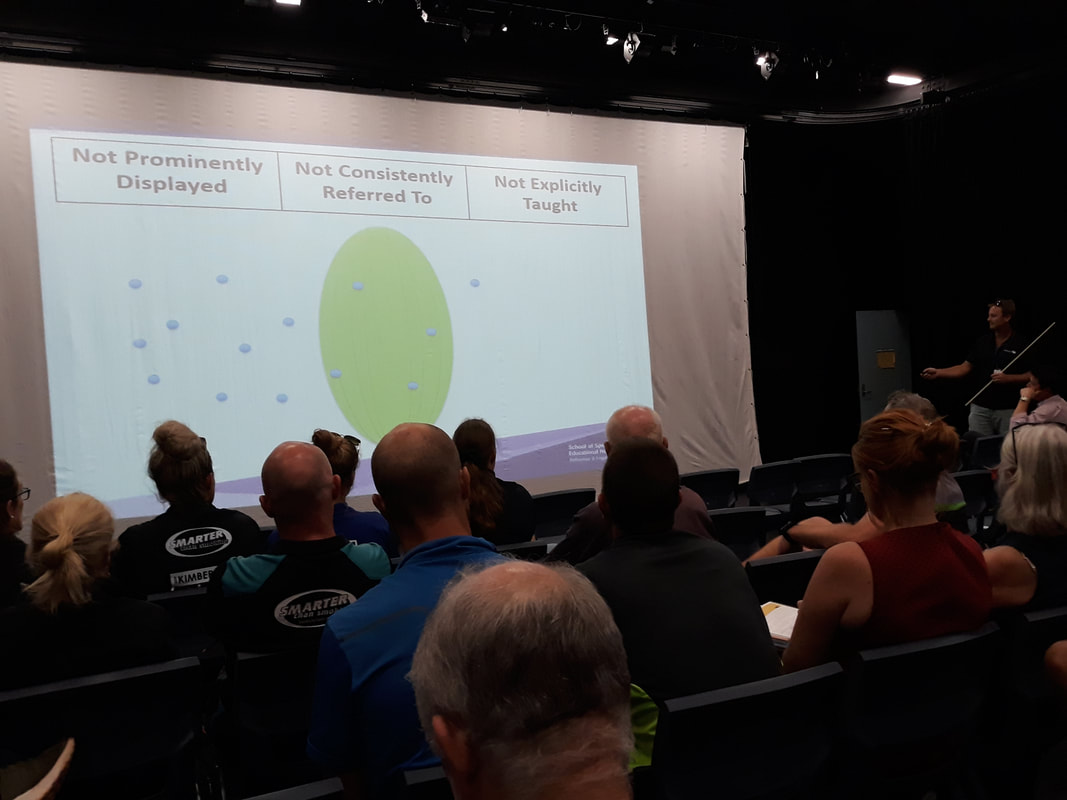Focus area 6.1 - Identify and plan professional learning needs.
Use these professional standards and advice from colleagues to identify and plan professional learning needs.
In order to effectively plan for meeting my professional learning needs, upon graduating I compiled a professional learning plan which outlines key priorities for my professional learning, links to the Australian Professional Standards for Teachers, and suggested and actual ways for me to meet these needs.
In supporting me in progressing towards my full registration, Broome Senior High School has provided me with a mentor teacher, with whom I meet with frequently and from whom I receive advice and support. The images below provide one example of how I used observation from my Head of Learning to improve my practice. In this case, my goal was to use Wiggins and McTighe's WHERETO framework to inform lesson planning and delivery. The lesson plan, shown below was provided to my Head of Learning, who then observed the lesson, annotated the lesson plan and provided detailed feedback, also shown below. The presentation shown here demonstrates how I implemented this framework, sought collegial feedback on it and reflected on it in order to improve my practice.
Use these professional standards and advice from colleagues to identify and plan professional learning needs.
In order to effectively plan for meeting my professional learning needs, upon graduating I compiled a professional learning plan which outlines key priorities for my professional learning, links to the Australian Professional Standards for Teachers, and suggested and actual ways for me to meet these needs.
In supporting me in progressing towards my full registration, Broome Senior High School has provided me with a mentor teacher, with whom I meet with frequently and from whom I receive advice and support. The images below provide one example of how I used observation from my Head of Learning to improve my practice. In this case, my goal was to use Wiggins and McTighe's WHERETO framework to inform lesson planning and delivery. The lesson plan, shown below was provided to my Head of Learning, who then observed the lesson, annotated the lesson plan and provided detailed feedback, also shown below. The presentation shown here demonstrates how I implemented this framework, sought collegial feedback on it and reflected on it in order to improve my practice.
Focus area 6.2. Engage in professional learning and improve practice.
Participate in learning to update knowledge and practice, targeted to professional needs and school and/or system priorities.
Professional learning is fundamental to my practice and as an effective teacher and has taken many forms. Continuous professional reading and listening, as evidenced in my professional reading and listening log shown here, is part of my continuing practice. In additional to this, I have availed of engagement in professional learning activities at every opportunity. To cite one example, on 30.01.2019, I asked permission from The Association of Independent Schools WA, to join part of their professional development session in order to learn more by information providers Marninwarntikura Women's Resource Centre about Fetal Alcohol Spectrum Disorder and Trauma, in the context of how they affect learning. The resource produced for teachers by this organisation, shown here contains core principles for working with children who have experienced trauma, and I have employed many of these strategies in my teaching practice. In a second example, on 08.03. 2019, I requested permission from St. Mary's College in Broome, to participate in their Primary Campus' Literacy PD, where I learned practical strategies for literacy dedicated time and aspects of literacy including comprehension and guided reading, and also had the opportunity to reflect with other teachers, and set professional development goals within the content area.
Another core component of my professional learning practice, has been the participation in online education including webinars and lectures. One example of this is my completion of the Essentials in Literacy course, recommended to me by local educators, which offers ten essential literacy practices to be conducted in every classroom, everyday. Another example of where I have identified professional gaps in learning and then undertook training to help bridge that gap is when I completed the Department of Education's training for EAL/D learners: Improving Literacy and Numeracy - Support for English as an Additional Language or Dialect. A sample of notes I made during this training is shown here.
Participate in learning to update knowledge and practice, targeted to professional needs and school and/or system priorities.
Professional learning is fundamental to my practice and as an effective teacher and has taken many forms. Continuous professional reading and listening, as evidenced in my professional reading and listening log shown here, is part of my continuing practice. In additional to this, I have availed of engagement in professional learning activities at every opportunity. To cite one example, on 30.01.2019, I asked permission from The Association of Independent Schools WA, to join part of their professional development session in order to learn more by information providers Marninwarntikura Women's Resource Centre about Fetal Alcohol Spectrum Disorder and Trauma, in the context of how they affect learning. The resource produced for teachers by this organisation, shown here contains core principles for working with children who have experienced trauma, and I have employed many of these strategies in my teaching practice. In a second example, on 08.03. 2019, I requested permission from St. Mary's College in Broome, to participate in their Primary Campus' Literacy PD, where I learned practical strategies for literacy dedicated time and aspects of literacy including comprehension and guided reading, and also had the opportunity to reflect with other teachers, and set professional development goals within the content area.
Another core component of my professional learning practice, has been the participation in online education including webinars and lectures. One example of this is my completion of the Essentials in Literacy course, recommended to me by local educators, which offers ten essential literacy practices to be conducted in every classroom, everyday. Another example of where I have identified professional gaps in learning and then undertook training to help bridge that gap is when I completed the Department of Education's training for EAL/D learners: Improving Literacy and Numeracy - Support for English as an Additional Language or Dialect. A sample of notes I made during this training is shown here.
A key component of my professional learning as a graduate has been my participation in the Department of Education's Graduate Modules for teachers. These four modules, completed over two years, provide support for graduate teachers including advice on the Australian Professional Standards for Teachers, professional learning and strategies for teaching. Evidence of my participation in these graduate modules are shown below.
In addition to being a recipient of professional learning, I have also delivered professional learning to my colleagues. As a member of the trauma response committee, in conjunction with a colleague from the Aboriginal Education Team, I co-delivered a two-way professional development session to all staff at Broome Senior High School, over 150 people, on the subject of trauma responsive practice. This was the culmination of days of planning, based on years of reading, reflecting and practice.
During this 40-minute presentation, we outlined what it means to experience trauma, how this affects one's physiology and what teachers and school staff can do in response; primarily, to create an environment where relational safety is prioritised. We provided concrete advice on how to do this across three domains of relationships, learning environment and pedagogy and provided a checklist for staff to use to support implementing learnings from this PD. We invited and received feedback from staff, which was very positive, as evidenced here and here.
During this 40-minute presentation, we outlined what it means to experience trauma, how this affects one's physiology and what teachers and school staff can do in response; primarily, to create an environment where relational safety is prioritised. We provided concrete advice on how to do this across three domains of relationships, learning environment and pedagogy and provided a checklist for staff to use to support implementing learnings from this PD. We invited and received feedback from staff, which was very positive, as evidenced here and here.
Focus area 6.3 - Engage with colleagues and improve practice.
Contribute to collegial discussions and apply constructive feedback from colleagues to improve professional knowledge and practice.
I am very committed to engaging with colleagues and improving practice. Opportunities to learn are abundant and often a great source of learning is through observing. Another opportunity to engage with colleagues and improve practice has arisen through observing other teachers or student teachers in action and providing feedback. The feedback document shown here, provides an example of a situation where I provided feedback to a final year student teaching a kindergarten classroom. The email shown here, provides an example of feedback given to ME by a student teacher who came to observe my lessons in the first year of my teaching.
Where opportunities have arisen to be observed in my teaching, I have availed of them. To cite one example, Broome Senior High School was implementing a school-wide focus on positive behaviours and invited teachers to be observed on their language towards students, with a particular focus on ratio of positive to corrective feedback. As shown by this record, I opted-in to this observation and used the feedback to try to improve my ratio in my interactions with students. I used this feedback to reflect and re-frame my interactions with students. Two weeks later, I asked the supervising teacher to return and analyse my interactions again, where his record showed that I had applied original feedback with the result being an increase in positive interactions with students. I have also been fortunate enough to be part of a collegiate environment where my skills and focus on relationships are acknowledged and valued, as shown by this Certificate of Acknowledgement given to me by my Head of Learning Area in August 2019.
As part of my transition to full registration, I participated in the Department of Education WA's Graduate Teacher Modules. During this time, I was explicitly exposed to evidence based teaching practices and engaged collegially with other graduate teachers to improve practice. Graduate Module 1 involved researching one teaching strategy or framework, implementing it over a period of time (one term) and reflecting on its efficacy. The presentation shown here demonstrates how I implemented this framework, sought collegial feedback on it and reflected on it in order to improve my practice.
The reflection note shown here, provides an example of how I have reflected on the best practices of colleagues and used them to build on my own. A note shown here provides evidence of how I observed my Head of Learning Area (HoLA) teaching, witnessing and learning from an example of best practice again. In a similar vein, the email shown here demonstrates my observation of a senior colleague teaching particularly complex content to a group of students and shares my reflections on how I used this learning to teach my own students effectively. Notes shown here and here provide evidence of collegial communications with colleagues underpinned by a desire to continuously improve practice. The image shown below (left) was taken during lesson where I availed of the expertise of a more experienced teacher when planning an assessment with students. During this lesson, I took my colleague aside and asked her opinion on how I had explained the task. My colleague gave positive feedback but added that I could have dug deeper with students in terms of choosing an assessment topic. She offered to facilitate this process with students; something which I lacked the experience to do. The result was much greater student clarity and understanding, which I thanked my colleague for afterwards, via email. In ways such as these, engaging with colleagues provides immeasurable benefits to professional practice.
I have been fortunate to have a HoLA who values reflection and to that end, engaging in planning and reflection each term is core to our practice. Notes shown here provide evidence of our start-of-term meeting where we consider which APST I will focus my professional lens on each term and consider strategies to do so. I have also been fortunate to be a part of a school where reflection and dialogue is embedded in the planning process. The photo shown below provides evidence of one of our planning sessions which asked teachers to reflect on the motivation for our work and our professional choices.
As a graduate teacher, I have also benefited from being provided with a mentor, to support my transition from graduate to proficient teacher. The photo below is evidence of one of my regular meetings with mentor Tracy Evans, discussing progression towards the Australian Professional Standards for Teachers and the corresponding requirements of the Department of Education, WA of their graduate teachers.
Contribute to collegial discussions and apply constructive feedback from colleagues to improve professional knowledge and practice.
I am very committed to engaging with colleagues and improving practice. Opportunities to learn are abundant and often a great source of learning is through observing. Another opportunity to engage with colleagues and improve practice has arisen through observing other teachers or student teachers in action and providing feedback. The feedback document shown here, provides an example of a situation where I provided feedback to a final year student teaching a kindergarten classroom. The email shown here, provides an example of feedback given to ME by a student teacher who came to observe my lessons in the first year of my teaching.
Where opportunities have arisen to be observed in my teaching, I have availed of them. To cite one example, Broome Senior High School was implementing a school-wide focus on positive behaviours and invited teachers to be observed on their language towards students, with a particular focus on ratio of positive to corrective feedback. As shown by this record, I opted-in to this observation and used the feedback to try to improve my ratio in my interactions with students. I used this feedback to reflect and re-frame my interactions with students. Two weeks later, I asked the supervising teacher to return and analyse my interactions again, where his record showed that I had applied original feedback with the result being an increase in positive interactions with students. I have also been fortunate enough to be part of a collegiate environment where my skills and focus on relationships are acknowledged and valued, as shown by this Certificate of Acknowledgement given to me by my Head of Learning Area in August 2019.
As part of my transition to full registration, I participated in the Department of Education WA's Graduate Teacher Modules. During this time, I was explicitly exposed to evidence based teaching practices and engaged collegially with other graduate teachers to improve practice. Graduate Module 1 involved researching one teaching strategy or framework, implementing it over a period of time (one term) and reflecting on its efficacy. The presentation shown here demonstrates how I implemented this framework, sought collegial feedback on it and reflected on it in order to improve my practice.
The reflection note shown here, provides an example of how I have reflected on the best practices of colleagues and used them to build on my own. A note shown here provides evidence of how I observed my Head of Learning Area (HoLA) teaching, witnessing and learning from an example of best practice again. In a similar vein, the email shown here demonstrates my observation of a senior colleague teaching particularly complex content to a group of students and shares my reflections on how I used this learning to teach my own students effectively. Notes shown here and here provide evidence of collegial communications with colleagues underpinned by a desire to continuously improve practice. The image shown below (left) was taken during lesson where I availed of the expertise of a more experienced teacher when planning an assessment with students. During this lesson, I took my colleague aside and asked her opinion on how I had explained the task. My colleague gave positive feedback but added that I could have dug deeper with students in terms of choosing an assessment topic. She offered to facilitate this process with students; something which I lacked the experience to do. The result was much greater student clarity and understanding, which I thanked my colleague for afterwards, via email. In ways such as these, engaging with colleagues provides immeasurable benefits to professional practice.
I have been fortunate to have a HoLA who values reflection and to that end, engaging in planning and reflection each term is core to our practice. Notes shown here provide evidence of our start-of-term meeting where we consider which APST I will focus my professional lens on each term and consider strategies to do so. I have also been fortunate to be a part of a school where reflection and dialogue is embedded in the planning process. The photo shown below provides evidence of one of our planning sessions which asked teachers to reflect on the motivation for our work and our professional choices.
As a graduate teacher, I have also benefited from being provided with a mentor, to support my transition from graduate to proficient teacher. The photo below is evidence of one of my regular meetings with mentor Tracy Evans, discussing progression towards the Australian Professional Standards for Teachers and the corresponding requirements of the Department of Education, WA of their graduate teachers.
In December, 2020, I won a scholarship to attend the English Teachers Association of Western Australia's Annual Conference (ETAWA). This provided an invaluable opportunity to engage with professional learning networks to improve practice. Following this conference, I delivered a presentation to my colleagues, sharing key insight I gained from this experience. This presentation is shown here. Furthermore, I reflected deeply upon this conference and wrote a submission to the ETAWA for publication in their bi-annual publication. This submission is shown here.
Focus area 6.4 - Apply professional learning and improve student learning.
Undertake professional learning programs designed to address identified student learning needs.
I consistently engage in professional learning programs wherever the opportunity arises. The notes shown here and here reflect learnings from a professional development program around guided reading and comprehension. The photo shown below is evidence of a professional development session around the impact of teacher language on student behaviour.
In addition to professional learning opportunities which have presented themselves to me, I have also actively sought ways to learn in areas that I considered I needed greater development. One example of this is my completion of the Literacy Essentials Course run by Professor Nell Duke at the Michigan Literacy Task Force This ten-module course was invaluable in shaping how I approached the teaching of literacy in a primary context and also informed how I taught English at High School level including some core principles such as providing short, explicit mini-lessons, providing extensive modelling and considerable opportunities for independent practice.
Another example of my sourcing professional learning opportunities, was connecting with Marninwarntikura Women's Resource Centre and asking permission to attend one of their training sessions on complex trauma and foetal alcohol syndrome disorder. A photo from this session is shown below.
Undertake professional learning programs designed to address identified student learning needs.
I consistently engage in professional learning programs wherever the opportunity arises. The notes shown here and here reflect learnings from a professional development program around guided reading and comprehension. The photo shown below is evidence of a professional development session around the impact of teacher language on student behaviour.
In addition to professional learning opportunities which have presented themselves to me, I have also actively sought ways to learn in areas that I considered I needed greater development. One example of this is my completion of the Literacy Essentials Course run by Professor Nell Duke at the Michigan Literacy Task Force This ten-module course was invaluable in shaping how I approached the teaching of literacy in a primary context and also informed how I taught English at High School level including some core principles such as providing short, explicit mini-lessons, providing extensive modelling and considerable opportunities for independent practice.
Another example of my sourcing professional learning opportunities, was connecting with Marninwarntikura Women's Resource Centre and asking permission to attend one of their training sessions on complex trauma and foetal alcohol syndrome disorder. A photo from this session is shown below.
